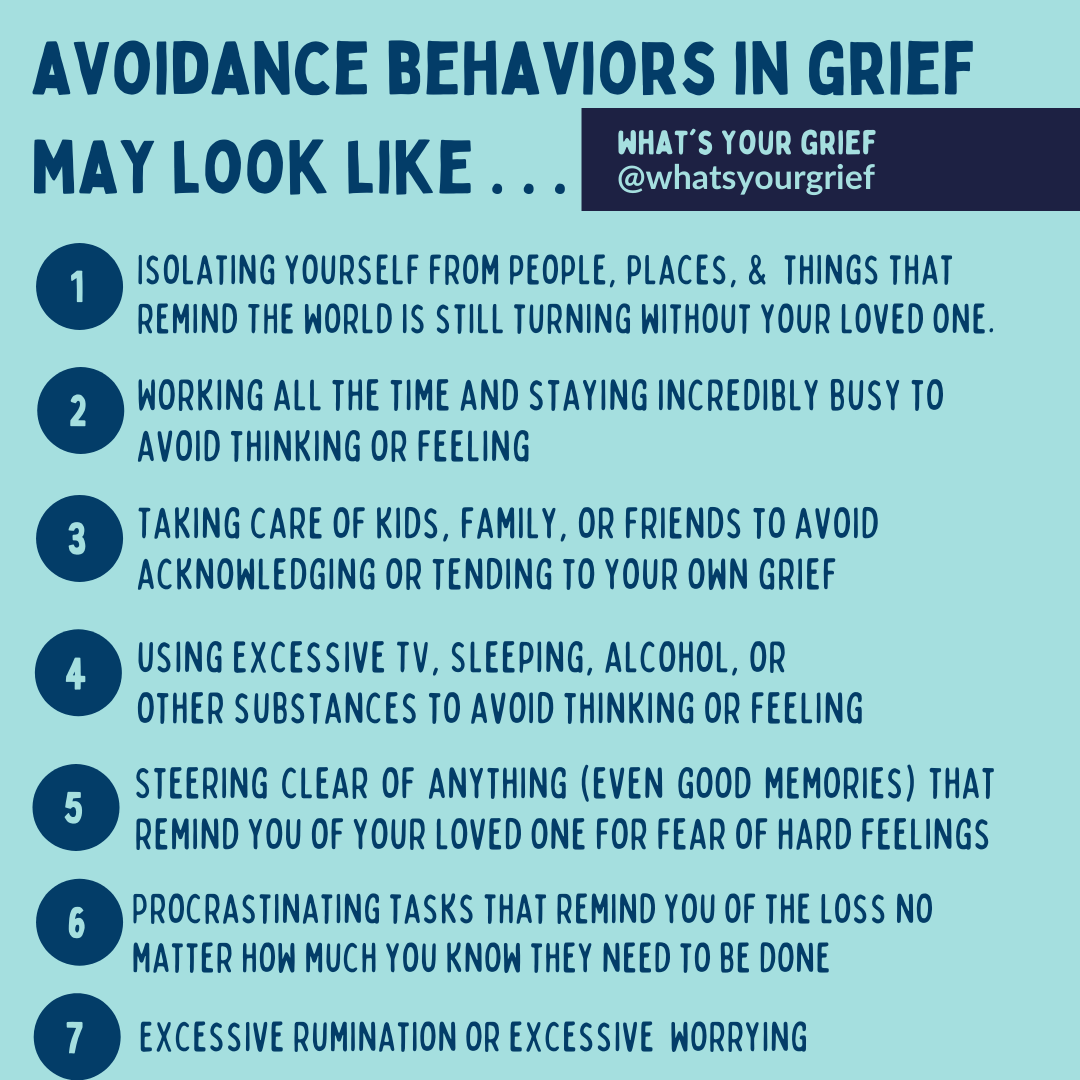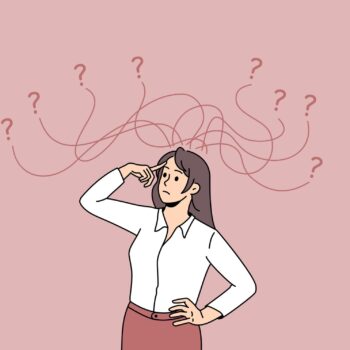Addressing Chronic Avoidance of Grief
/ Understanding Grief : Litsa
Last week we wrote an article about avoidance behavior in grief. No surprise, more than a few people shared that they saw themselves in the description. Our social media comments and DMs blew up with one common question: “I think I’m one of those people engaged in chronic avoidance of grief. What do I do about it?!”
Today we want to answer that tough question - how do you deal with grief avoidance? But if you missed it, read the avoidance behavior article first (or this article on understanding avoidance). Today’s article isn’t nearly as helpful if you haven’t read to get a good understanding of avoidance in grief.
Before we dive in, please keep in mind that we’re not suggesting you should never engage in some avoidance coping. Quite the opposite – healthy grief often involves taking breaks, which means some balanced avoidance. The Dual Process Model of Grief even includes that as part of grief! The tips we’re sharing today are designed to address avoidance if you’re worried it's well beyond the healthy type. Chronic, pervasive avoidance feels useful when coping early in grief but makes it hard to adapt in the long run. So how do you break the habit of avoiding your grief?
Below we’ve gathered some of our tips for facing your avoidance of grief, along with suggestions from our amazing grief community over on Instagram. This isn’t a comprehensive list, but rather a place to get you started. We’d like to keep this list growing, so if you have ideas or suggestions we haven’t covered please leave a comment down below.
10 Tips to Stop Avoiding Your Grief
- Remember that hard emotions are hard, but they aren’t bad or dangerous. It is okay to cry and yell and scream. Remind yourself that it feels excruciating, but you will survive the feelings and you are safe. The more you allow yourself tolerate the distress of hard feelings, the more practiced you become. The emotions are still just as heavy, but actually feeling them is the first step towards slowly getting stronger and better able to carry them.
- Drop the self judgement. Sometimes avoidance happens because of the pain of the emotions themselves. But sometimes there is an added layer of pressure that we put on ourselves through judgement, saying things to ourselves like, "It is wrong to feel this way", “I should be dealing with this better”, “this shouldn’t be so hard”, or “I should be over this by now”. Remember, there is no timeline for grief and there are no “shoulds”. Emotions aren't good or bad, they just are. Whatever feelings come up, try to just notice them from a place of curiosity, awareness, and non-judgement.
- Learn how to self-soothe. Okay, I know that “self-soothe” is a weird, mental-health-jargon word. But I’m not sure of a better word. “Self-soothing” is just what it sounds like: calming and comforting yourself when you are feeling difficult or uncomfortable things. If you are going to change some of those chronic avoidance patterns and feel difficult feelings, knowing the ways to take care of yourself is important.
- Identify what you’re avoiding and your avoidance tactics. If you’re going to cut back on your avoidance and start feeling those grief feelings, the first step is identifying what and how you’re avoiding. Remember, this isn’t about ceasing all avoidance. But it is about increasing an awareness of your avoidance so you can cut back in the places you want or need to while embracing moderate avoidance for some temporary grief-relief. Sometimes you know exactly when and how you’re avoiding. Sometimes it can be sneaky. Considering this list is a place to start:

- Ease in when reintroducing yourself to places or things you’ve been avoiding. If you haven’t dared to open your husband’s closet since he died, jumping in to sorting through everything might feel impossible. If you’ve added twenty extra minutes to your commute to avoid passing your son’s former high school, the idea of resuming the old route might cause your entire body to freeze up. Consider breaking things like this down into tiny steps and, if it feels right, enlisting support from others. Invite a supportive friend over and make a plan to simply open one drawer and see how it goes. Be open and prepared for tears. If it is too much, take a break. Maybe you’re not even near ready to drive past the school. That's okay. Can you bring it up on google maps street view and just look at it on your screen to start? Once you’ve done that a few times over a few weeks and started tolerating the feeling of seeing building, can you ask someone else to drive you past the school, with you in the passanger seat? Eventually can you build up to walking past? Then eventually driving, with your friend as a passenger? Hopefully you get the idea.
- Check yourself for toxic positivity or spiritual bypass. Sometimes we get messages that we need to use the power of positive thinking or our faith in a higher power to think our way out of difficult feelings. If you’ve ever thought you just needed to manifest a better mindset or increase your faith to cure those tough grief emotions, you may want to read more about these sneaky forms of avoidance. Don’t get us wrong, mindset is important and faith can be a great comfort, but both exist alongside grief. They aren’t alternatives to grieving. Read more about toxic positivity here and more about spiritual bypass here.
- Schedule time for grief. I can practically hear some of you screaming “I wish I could ‘schedule’ my grief. Part of the problem is that it comes up out of no where, at the worst times!”. Very true. Sometimes the reason our brains become so good at compartmentalizing grief emotions is because of that fear. We worry the feelings will knock us on our ass at the most inopportune times. This is exactly why scheduling time is so valuable. Every week find time to journal, take a walk where you just think and cry, or sit with your grief emotions in some other way. This gives you a safe time to feel, process, express, yell, scream, cry, laugh, and generally practice getting more comfortable with those hard feelings (and the comforting grief feelings too). When feelings come up unexpectedly at inopportune times, give youself permission to feel them anyway. If that isn't possible, notice the emotion coming up. Say to yourself, “alright, this is a lot and I’m in the middle of a work meeting. But I am going to make a mental note to come back to it tomorrow morning when I’m journaling”. This can allow some sense of control without simply stuffing the emotion and never coming back to it.
- Work with a therapist. Sometimes scheduling grief time on your own just doesn’t cut it. Either you don’t hold yourself to it or the emotions feel too overwhelming and scary to process on your own. Either or both of those are wonderful reasons to start working with a grief therapist. This gives you external accountability for creating the space to feel your feelings. It also gives you some added support and an added prompting to explore some of the feelings that might most be triggering avoidance.
- Follow grief accounts on social media. When gathering these suggestions, several people said they found WYG on social specifically to stop their grief avoidance. Social media scrolling can definitely be an avoidance tactic. It is fine in moderation, but a problem if it is preventing you from ever feeling your feelings. Following a few grief accounts or grief hashtags can help you to intersperse a little bit of grief support into your scrolling (you can find us @whatsyourgrief).
- Reward yourself. Changing chronic avoidance is tough. Spending time with hard feelings is difficult and draining. Remember to reward yourself with a well-deserved break and some self-care after you've deliberately tended to grief. Schedule in self-care sessions immediately after therapy or following the time when you’ll be otherwise spending time with your grief.

We invite you to share your experiences, questions, and resource suggestions with the WYG community in the discussion section below.
We wrote a book!
After writing online articles for What’s Your Grief
for over a decade, we finally wrote a tangible,
real-life book!
What’s Your Grief? Lists to Help you Through Any Loss is for people experiencing any type of loss. This book discusses some of the most common grief experiences and breaks down psychological concepts to help you understand your thoughts and emotions. It also shares useful coping tools, and helps the reader reflect on their unique relationship with grief and loss.
You can find What’s Your Grief? Lists to Help you Through Any Loss wherever you buy books:





Karen Carter June 29, 2022 at 5:13 am
A short time ago I witnessed 2 Co-workers in a work truck swerve into a lane to the right, and suddenly accelerated to the left and the truck went over the side of a cement barrier and they landed On the front grill of the truck, it then exploded into fire and neither one could release seatbelts to get out and they burned to death.
Later that day I remember calling my employer and saying something about setting her up with a very nice man I know, whom is available, and I have never met my co-worker before. I only spoke to her via phone about new assignments coming my way. Strictly professional conversations only. Needless to say, I was extremely embarrassed and could not understand the connection to the trauma I experienced seeing. These were very nice people who had nice families. WT HECK? THEY HAD KIDS AND WIVES and I witnessed this horrible incident?
Felice May 23, 2022 at 1:34 pm
Hi Ali,
First of all, I want to say how sorry I am about the loss of both of your beloved pets. My heart breaks for you.
I also am struggling with avoidance issues. For me grief feels alot like fear. There are tasks that I need to do, that I avoid (even simple things). I found a grief support group thst had helped me to feel a bit more connected which had helped to normalize and unravel many of the feelings that i am experiencing. There is a book by David Kessler and Louise Hays called “You Csn Heal Your Heart” that discusses all types of losses, including pets. There are many other good books out there about grief and loss that may also be helpful. Your losses all happened within a short period of time.
Avoidance makes ne ferl stuck, so I have to plan ahead and psych myself in order to get tasks done. Its easier to put things off because of this anxiety.
Jean May 22, 2022 at 3:48 pm
I don’t know if this is common but my eldest son walked out of my life over 25 years ago. We never had a row, he never say down to talk out his issues and his only comments were to tell me I am a waste of space and a failure as a mother. I suffer from bi polar but was always loving and gentle. My illness did affect my power of thinking clearly and I made a lot of bad decisions which had a negative influence on my children. I have apologise so many times over the years but I live in permanent state of numbness,grief and social isolation more and more. I have lost my son and I can not forgive myself for my mistakes. I feel a failure and irrelevant. I watch endless Television as I can not bear to feel the pain of rejection and loss even though there are times when the grief and loss sweep over me like a tsunami and I literally feel like I am drowning. I am nearly 70 and my son is now 48. I don’t think I will ever heal. He is successful and getting on with his life and I cut myself off more and more from the outside world. It’s too full of pain.
Litsa May 25, 2022 at 8:17 pm
I am so sorry for what you are coping with – you may find this article of some support – https://whatsyourgrief.com/ambiguous-grief-part-2/
Deidre Lockyer May 11, 2022 at 1:56 am
I’ve been on a convoluted path to find this page but I’m glad l did. I have some severe chronic mental health issues and now I’m finding the panic attacks I have have turned into this slowing of time, the endless sense of dread and breaking up of reality. I’m still trying to understand it but I have been avoiding it like the plague, trying to stay away from it, which in itself is avoiding grief, l think. I feel I might be on the right path now, finding this. Thank you 🙂
Ali April 3, 2022 at 9:37 pm
I hope you won’t feel bad when you see that my grief is about two dear pets. This comment is about avoidance.
I’m a retired woman. My passion has always been Physics. Some years ago, I started Physics at Uni. I was in Heaven! But then I had to move to another town. I have no car and can’t afford the bus.
When the pandemic burst out, I had the chance to study virtually.
Regretfully, my dear old dog became first blind, then started with dementian and after that, with seasures. One terrible whole year.
When she got dementia – already blind – she starting pacing all night long. To protect her, I surrounded a double bed setting with matresses and other things and was with her studying in the “fenced area”. I disn’t know she was dying. The vets thought it was just old age (14).
One day, during a virtual exam, there was a problem with the scanner and time was running out. She stepped on all the mess of papers dropped everything (cel phone, all the exam scattered out of range). I got out of my mind and started yelling at her in a middle of a nervous breakdown.
When she started having seasures, the vet said that it was probably a brain tumour. It could be controlled. I quit my study and chose her above everything… until she died on my lap.
A month later I had to put my 7 year old cat down due to a cancer that did not respond to palliative care.
The fact is that every time I try to just READ something about Physics, I just can’t. I feel guilty. I can’t do it. Neither can I train. I took me a lot of effort not to go on avoiding the garden (where the little graves are). All my plants died because of that. Now I force myself to sit there for a while but I don’t enjoy it. It feels like taking a yacky medicine.
I can’t affird a terapist.
I thought that – maybe – somebody might relate to what’s happening to me with avoidance and could overcome it.
Thank you.
(Please, forgive my English. I’m a native from Argentina).
Krysten March 15, 2022 at 7:18 pm
At the end of March it will be 14 years since my best friend, my sister, died from complications due to pulmonary arterial hypertension. She was 22 years old. Now she will always be 22 years old.
We were 3 years apart, fought constantly as children, and became so close as adults that we both said on separate occasions that we would never be able to survive without the other. She was my person.
I survived any way I could. I tried to make some “good” come out of this tragedy. I wrote a book about her life and her struggles with this disease. And when the anger began to overtake me, I numbed myself using anything and everything I could get my hands on.
I have no idea how it has been 14 years. Thanks to the numbing behaviours I have been feeling the grief only in the last few years and every time I feel anger or sadness I start to panic.
My therapist has been wonderful. But it all hurts so much. I wonder if it would still hurt this much if I had just allowed myself to feel it all then. Each painful loss since losing her had also needed to be numbed for fear that I wouldn’t survive it. But I am surviving. I just don’t know when I will get out of survival mode.
Anne February 24, 2022 at 1:50 am
This website is an absolute game changer amazing. It (and the comments that follow) are so insightful intelligent and helpful. Like reaching out to a drowning person. This morning at 3 am when I felt for the thousandth time it would be better not to be here I read the grief avoidance thank you.
Diane February 20, 2022 at 5:37 pm
It’s nearly a year since my husband died at home of cancer. It was a dreadful end which my adult daughter shared with me. I think I probably grieved a little when the cancer was diagnosed but there’s been nothing significant since. I feel I need to hide any strong emotion from my daughter. We do talk about him but without emotion, which doesn’t seem right .
We had been married just short of 50 years and I thought he would always be there. I talk to his photo when I’m on my own and I try to feel sad but I can’t. I can’t bring myself to scatter his ashes. I can’t feel his presence…I thought I would but there’s nothing. Although my daughter lives with me I feel empty inside, even though I am very busy socially. I’m sure friends think I’m odd because I don’t cry….but they are all very supportive.
Will grief come at some point ?
plain Jane January 14, 2022 at 9:42 am
Yes, I lost someone I loved to suicide over 35 years ago. Over the past year or so I have spent a lot of time alone, thus, I started thinking of him and missing him and then feeling the anger and avoidance of the whole affair of his death.That anger, kept me busy and empty all those years and to never trust to love again.
Juanita February 21, 2022 at 10:14 am
This comment sounds to be me expressing what I have been feeling. Why now…
Curtis December 1, 2021 at 5:50 pm
Giving yourself permission to grieve is the first step. Setting a routine that works for you and or family is the second step and taking care of yourself physically, eating very little processed food, and taking care of self spiritually is the third.
Litsa December 22, 2021 at 10:07 am
Thanks for your suggestion, Curtis. The process and priorities in grief look different for everyone, because everyone’s needs are different. But giving yourself permission is so important and addressing foundational needs are critical to being able to grieve and slowly move forward.
Julia Daubs November 25, 2021 at 1:22 am
It’s been 14 months and 8 days since my 32 year old brother died in a fatal accident. He was ejected and car crushed him. I feel so empty. There’s a big black hole in my heart and nothing fills it. I want him back. We were close. Very tight family. It’s the night before Thanksgiving and I’ve been crying for 6 hours because 12 days ago my father died. He died from a broken heart. My brother was party planner. Family outings organizer he basically was the life of the family. Nothing is the same. The wind outside hurts my skin. And people are outsiders and have no idea of my feelings at the moment. I don’t think it will ever be ok again. In my family siblings and cousins are best friends. But there are no parties w whole family anymore. It’s postponed or very brief. We had so much fun together I can’t imagine ever to be that happy again. And it’s not just me. Extended family is hardly around now a d there’s no more laughter at my parents or at family functions. I feel abandoned and left behind. I’m even alittle jealous my father is with him right now. It’s not fair. It’s not how life was supposed to be and I wonder if happiness or a good laugh is a gift to be treasured because I know there is nothing but pain and dullness. Even the colors in the world have changed. Not sure counseling will help
Lois November 17, 2021 at 12:06 pm
It took me three years to look through my daughter’s clothes. A friend recommended that I take pictures of any I was going to give away – good tip. First phase was just to box up ones I was ready to let go – but the box stayed in the room for a few months. Second phase was to take the boxes to the second-hand store she loved. I was a mess handing over the boxes but I did it. My two other daughters and her best friend took some of her clothes as did I, and I wear those now (eight years later) with good memories. There are a few clothes I can never part with and that’s okay with me, but the majority have found new homes.